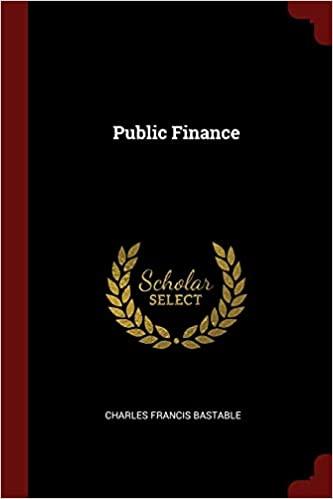Question
Decisions involving capital expenditures often require managers to weigh the costs and benefits of different options related to the financing of a project. For instance,
Decisions involving capital expenditures often require managers to weigh the costs and benefits of different options related to the financing of a project. For instance, deciding when to call a bond before maturity due to changing interest rates can lower the overall cost of a project significantly through refinancing. So, it is important to be able to understand the real interest rate being paid out to your bondholders (yield) at any given time.
For this Assignment, review the information presented in Problem 7-18 on page 267 of your course text. You will utilize the information in this week's readings and media to make a recommendation with regard to when to call a bond.
Prepare a spreadsheet using Excel or a similar program in which you compute the items listed in parts a, b, and d. Be sure to compute the Yield-to-Maturity (YTM) and Yield-to-Call (YTC) for each of years 5, 6, 7, 8, and 9. Utilizing Word, prepare a written report to your finance director:
Include a detailed explanation of the conclusion you reached concerning whether or not to call the bond before maturity.
If your recommendation is to call the bond early, explain when to call the bond and your rationale.
Discuss the advantages and disadvantages of using a long-term loan instead of a bond.
YIELD TO MATURITY AND YIELD TO CALL Kaufman Enterprises has bonds outstanding with a $1,000 face value and 10 years left until maturity. They have an 11% annual coupon payment, and their current price is $1,175. The bonds may be called in 5 years at 109% of face value (Call price =$1,090).
a. What is the yield to maturity?
b. What is the yield to call if they are called in 5 years?
c. Which yield might investors expect to earn on these bonds? Why?
d. The bonds indenture indicates that the call provision gives the firm the right to call the bonds at the end of each year beginning in Year 5. In Year 5, the bonds may be called at 109% of face value; but in each of the next 4 years, the call percentage will decline by 1%. Thus, in Year 6, they may be called at 108% of face value; in Year 7, they may be called at 107% of face value; and so forth. If the yield curve is horizontal and interest rates remain at their current level, when is the latest that investors might expect the firm to call the bonds?
Step by Step Solution
There are 3 Steps involved in it
Step: 1

Get Instant Access to Expert-Tailored Solutions
See step-by-step solutions with expert insights and AI powered tools for academic success
Step: 2

Step: 3

Ace Your Homework with AI
Get the answers you need in no time with our AI-driven, step-by-step assistance
Get Started


